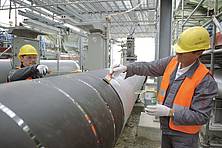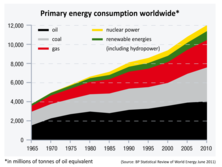Münster (Germany), 27 June 2012 – The reactor catastrophe in Fukushima has shattered trust in nuclear power throughout the world and led many countries to rethink their energy policy. Just three months after the nuclear incident, Germany committed itself to phasing out nuclear energy by the year 2022. At the same time, greenhouse gas emissions are to be reduced by 40% by 2020 and 55% by 2030. With these ambitious goals Germany is leading the way in the international community of states.
Energy revolution is necessary and technologically feasible
Fossil fuel deposits are finite and will be exhausted in the foreseeable future. The carbon dioxide released when they are used promotes global warming and leads to climate changes worldwide. Nuclear energy has turned out not to be a sustainable alternative. An uncontrollable residual risk is associated with the technology and the issue of radioactive waste storage has still not been resolved. On the other side of the equation, the energy demand remains high in the western industrial nations and there is a growing hunger for energy in the newly industrialized countries. A future-viable, sustainable energy supply is one of the greatest societal challenges of our time. The energy revolution must be based on the following components: increasing energy efficiency and developing renewable energies. In this context, climate protection, security of supply and economic viability must be reconciled with each other. A secure supply can – at least in the next decades – only be ensured through the parallel use of conventional energy resources.
Increasing energy efficiency
From an economic point of view, programmes to increase energy efficiency are the most appropriate way towards an energy revolution. Using energy-efficient technologies can save valuable resources (fossil fuels, electricity from nuclear power). Experts believe that, in the short term at least, twice as much can be achieved through energy-saving measures as by developing renewable energy sources. Many of the measures pay off in the near term, i.e. the investments have been recovered after just a few years. One of the simplest, most cost effective and efficient energy-saving measures is the optimal insulation of mechanical equipment – this is true both for the building sector and for industry. As a recent study by Ecofys, an internationally leading consultancy in renewable energy and energy efficiency, has shown, the insulation of industrial plant is not usually economically designed. The use of optimized insulation systems allows energy savings of up to 45%. In industry these investments have often paid off after just a few months. Unlike in the case of buildings or transport, there is as yet no energy-saving programme for the industrial sector. In October 2009, leading insulation manufacturers and insulators founded the EiiF (European Industrial Insulation Foundation) to draw attention to the enormous potential for energy and CO2 savings and to bring about changes in industry.
Developing renewable energies
The aim of a sustainable energy supply is to replace finite fuels (oil, gas, uranium) with renewable resources such as solar energy, wind power, geothermal energy, biomass, hydropower or ocean thermal energy. The conditions for the various energies differ from country to country and therefore cross-border concepts which take seasonal fluctuations into account are to be recommended. In recent years, increasingly efficient technologies for generating energy have been developed, however there is a lack of cost-effective storage technologies. The aim is to link the generation, transport and storage of renewable energies intelligently. Obviously the precept of energy efficiency also applies to renewable energies. Here, too, optimal insulation – of the pipes of solar thermal systems, for example – plays a crucial role in ensuring that as little of the solar gain as possible is lost.
Ensuring security of supply
By the year 2020, the proportion of renewable energy in the final energy consumption of the European Union should amount to 18 %; by 2050, 80 % of the electricity generated should be derived from renewable energies. Securing the energy supply is at the top of the political agenda in the EU member states in order to prevent ‘the lights going out’ over Europe. Natural gas is relatively low emission, but depends to a great extent on imports and holds risks as far as the price is concerned. To increase the security of supply and reduce the dependence on the major natural gas providers (Russia and the CIS countries), natural gas is stored on a large scale in underground caverns and liquid natural gas (LNG) is becoming more and more important. By cooling natural gas down to -162 °C it is reduced to one six-hundredth of its volume and can be transported economically by LNG tankers. In this way, natural gas can be provided by regions which are not connected to Europe by pipelines. This reduces the dependence on individual supplier countries and increases the security of supply.
Armacell’s customers are well positioned for the energy revolution. ArmaFlex insulation materials for mechanical equipment in buildings and industry have proven themselves millions of times all over the world. The company provides a wide range of product solutions – from pre-insulated solar pipes to special cryogenic insulation systems for LNG technology. As the energy-saving sector the insulation industry is spearheading the energy revolution.


